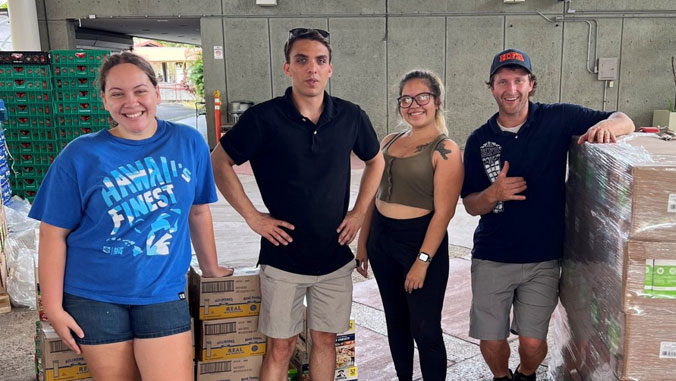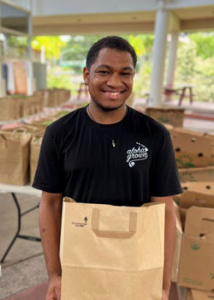
University of Hawaiʻi at Hilo student leaders in the Ka Pouhana Mentoring Program are busy this summer distributing food to local communities. Ka Pouhana is a community-based program that organizes and provides peer and faculty mentoring for students from Hawaiʻi. The group’s student leaders are currently participating in Kaukau 4 Keiki, a collaborative effort headed by the local non-profit Vibrant Hawaiʻi. The UH Hilo campus is one of 33 distribution sites islandwide for the project.

Kalehua Kukahiko, a coordinator at the UH Hilo Center for Place-Based Socioemotional Development where the mentoring program is housed, said the students are taking the lead to pack and distribute 500 meal bags for families in the community for six weeks.
Kaukau 4 Keiki, launched this summer in June, has engaged more than 100 volunteers across 33 sites islandwide to serve 7,894 keiki and distribute more than 220,000 meals. In addition to ensuring food security for thousands of keiki over the summer months, the program is a demonstration of cross-sector collaboration that unites community, non-profit and faith organizations, local farmers, and businesses, and county and state government agencies.
“It has been incredible to watch our Ka Pouhana leaders accept the delivery of multiple pallets from Hawaiʻi Food Alliance and Hilo Produce, organize and count food items to hand off to three other community organizations and then pack 500 bags to hand out from 3 to 5 p.m. in a drive-through pick up on campus,” said Kukahiko.
Laʻakea Judd, a Ka Pouhana peer mentor who is site leader for the Kaukau 4 Keiki activity at the UH Hilo campus, said, “If we have the ability to change the world, and impact the lives of those around us, why not start in our own communities? By sacrificing your time, money and energy for others, you’re not only serving your community, you’re also changing someone’s life for the better.”
For more information visit UH Hilo Stories.
—By Susan Enright

